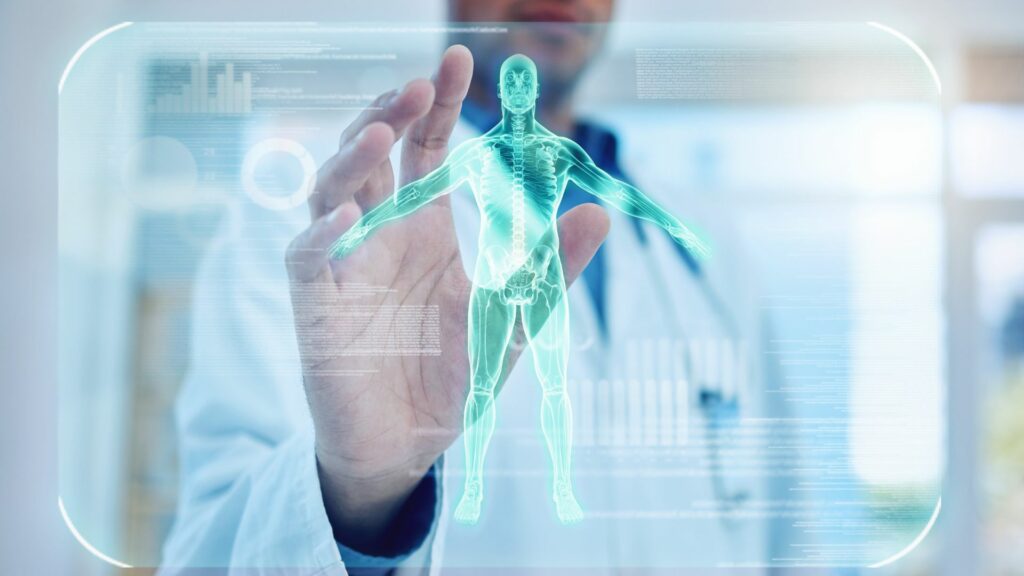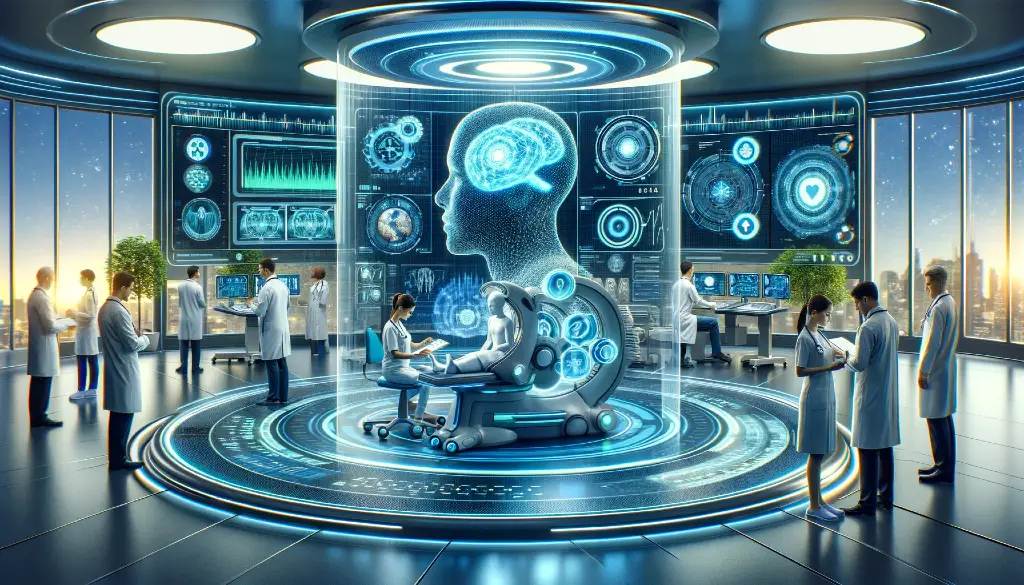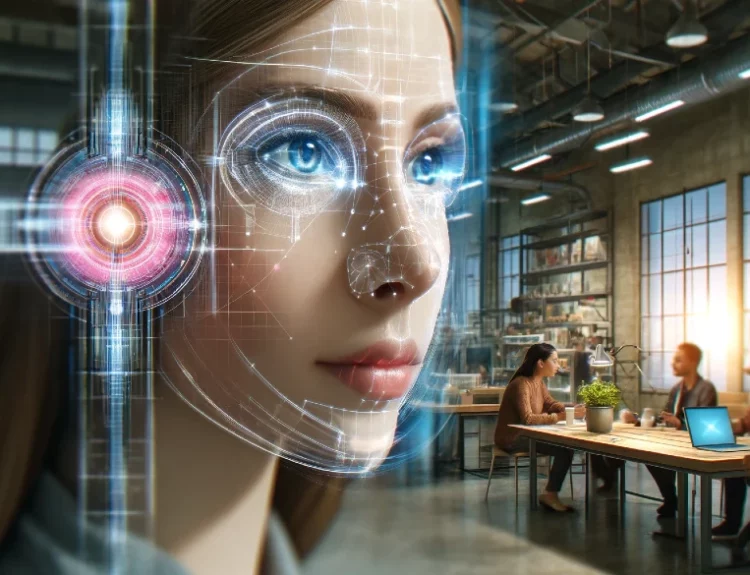Introduction
AI in Healthcare: Imagine a world where diseases are diagnosed with unparalleled accuracy, treatments are tailored to individual patients’ needs, and healthcare outcomes are optimized for every individual. This isn’t a distant utopia—it’s the reality that artificial intelligence (AI) is bringing to the field of healthcare.
From predictive analytics to personalized medicine, AI is revolutionizing patient care in ways we could only dream of a few years ago. In this blog, we’ll explore the transformative power of AI in healthcare, diving into its applications, advancements, and the profound impact it’s having on patient outcomes. Join us on a journey to discover how AI is reshaping the landscape of healthcare, one algorithm at a time.
The Role of AI in Healthcare
Artificial intelligence (AI) is not just a buzzword; it’s a game-changer in the field of healthcare. Its role extends far beyond simple automation tasks; AI is transforming how medical data is analyzed, diagnoses are made, treatments are administered, and patient outcomes are improved. At its core, AI in healthcare involves the utilization of advanced algorithms and machine learning techniques to process vast amounts of data and extract actionable insights.
From medical imaging to predictive analytics, AI is enhancing the capabilities of healthcare professionals and revolutionizing the delivery of patient care.
Applications of AI in Healthcare (Disease Diagnosis)
One of the most promising applications of artificial intelligence (AI) in healthcare is in disease diagnosis. AI-powered diagnostic tools are revolutionizing the way medical conditions are identified and treated. These tools leverage advanced machine learning algorithms to analyze medical data, including images, genetic information, and clinical notes, to assist healthcare professionals in making accurate and timely diagnoses.
For instance, in medical imaging, AI algorithms can analyze X-rays, MRIs, and CT scans with remarkable accuracy, helping radiologists detect abnormalities and identify potential signs of disease. Moreover, AI-driven diagnostic tools can analyze vast datasets of patient records and medical literature to identify patterns and risk factors associated with specific diseases, enabling earlier detection and intervention.
By harnessing the power of AI in disease diagnosis, healthcare providers can improve patient outcomes, reduce diagnostic errors, and ultimately save lives. In the following section, we’ll explore specific examples of AI applications in disease diagnosis and their impact on healthcare delivery.

Advancements in Personalized Medicine
Personalized medicine, once a distant concept, is now becoming a reality with the aid of artificial intelligence (AI). This approach to healthcare tailors medical treatments and interventions to the individual characteristics and needs of each patient, rather than adopting a one-size-fits-all approach. AI plays a crucial role in advancing personalized medicine by analyzing vast amounts of patient data, including genetic information, medical history, lifestyle factors, and treatment outcomes, to identify the most effective treatments for each individual.
For example, AI-driven algorithms can analyze genetic sequencing data to identify genetic mutations associated with diseases and predict how patients will respond to different medications. Additionally, AI-powered predictive analytics can help healthcare providers anticipate potential complications and adverse reactions to treatments, allowing for proactive intervention and personalized care plans.
As a result, personalized medicine has the potential to improve patient outcomes, minimize adverse effects, and optimize healthcare resources by targeting treatments to those who will benefit most.
Improving Patient Outcomes with AI in Healthcare
Artificial intelligence (AI) is revolutionizing patient care by improving outcomes across a wide range of healthcare settings. From patient monitoring to medication management, AI-driven solutions are optimizing care delivery and enhancing patient safety. One significant way AI is improving patient outcomes is through predictive analytics. By analyzing large datasets of patient information, AI algorithms can identify patterns and trends that may indicate a deterioration in a patient’s condition or an increased risk of complications.
This allows healthcare providers to intervene proactively, preventing adverse events and improving patient outcomes. Additionally, AI-powered decision support systems can assist clinicians in making more informed treatment decisions by providing real-time insights and recommendations based on the latest medical evidence and patient data.
Furthermore, AI-driven patient engagement tools, such as virtual assistants and mobile apps, empower patients to take an active role in managing their health, leading to better adherence to treatment plans and improved health outcomes.
Future of AI in Healthcare
The future of AI in healthcare holds tremendous promise for transforming the way we deliver and receive medical care. As technology continues to advance, so too will the capabilities of AI-driven solutions in healthcare. One exciting direction is the integration of wearable devices and remote monitoring technologies, allowing for continuous monitoring of patients’ health metrics and early detection of potential health issues.
Moreover, the adoption of telemedicine platforms and virtual care services is expected to increase, enabling patients to access healthcare services remotely and receive timely medical advice and treatment. Additionally, the rise of big data and interoperability initiatives will unlock new opportunities for AI to analyze vast datasets of medical information and derive actionable insights that can inform clinical decision-making and healthcare policy.
Furthermore, the development of AI-powered medical robots and autonomous systems has the potential to revolutionize surgical procedures, drug delivery, and patient care delivery in ways we’ve never imagined. As we continue to explore the possibilities of AI in healthcare, it’s essential to prioritize ethical considerations, data privacy, and regulatory compliance to ensure that AI technologies are deployed responsibly and ethically. By embracing these future directions and opportunities, we can harness the full potential of AI to improve patient outcomes, enhance healthcare delivery, and shape the future of medicine.
Conclusion
In conclusion, the integration of artificial intelligence (AI) into healthcare is transforming patient care in remarkable ways. From disease diagnosis to personalized medicine and patient outcomes, AI-driven solutions are revolutionizing the delivery of healthcare and improving the lives of patients around the world. By harnessing the power of advanced algorithms and machine learning techniques, healthcare providers can make more accurate diagnoses, tailor treatments to individual needs, and optimize care delivery to achieve better outcomes for patients.
As we look to the future, the opportunities for AI in healthcare are limitless, with innovations such as wearable devices, telemedicine, and medical robotics poised to further enhance the quality and accessibility of healthcare services.
At Verdict, we’re committed to revolutionizing the way people search for information online. Our AI-enhanced web search platform leverages advanced algorithms and machine learning techniques to deliver personalized and relevant search results tailored to each user’s preferences and interests.
By harnessing the power of AI, we’re empowering individuals to access information quickly and efficiently, enabling them to make informed decisions and discover new insights with ease. Join us on our mission to transform the way people search and discover information online with Verdict, where intelligence meets search.










